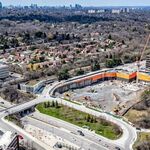http://www.theglobeandmail.com/news...-paths-in-plateau-mont-royal/article27980527/
If Montreal is any indicator, local businesses will suffer due to lack of parking. Undoubtedly businesses that are more dependent on drivers (like the music store) will suffer most. Even if you think that only a small percentage of customers drive, losing 10% of customers would kill a lot of small businesses that are operating on razor-thin margins.
I think it's entirely possible that business owners such as Remenyi are misunderstanding the relevance of the point in the purchase process customers frequent his store (and, as a result, the mode of transportation it's important to facilitate good infrastructure for). It should come as no surprise to anyone who's spent any amount of time on Bloor that foot traffic is greatest from pedestrians and cyclists, and not from cars.
If people want to buy a piano, not being able to visit his store because they can't park directly out front is not going to stop them from buying a piano. That's silly. Similarly, it's not reasonable to expect that people otherwise not expecting to purchase a piano will be casually driving down Bloor one sunny Saturday, pull up in front of Remenyi, feel moved to buy a piano, and expect to drive off with it in one fell swoop.
For every example similar to the one in Montreal referenced above, there are more studies that suggest that revenue for businesses along stretches where protected bike lanes were installed increased, which is of course to be expected as a result of the correlation and causality between more people being easily able to access a business, then actually accessing it, and completing purchases.
Cases in point:
>
This Citylab article points to:
// Portland, where 78 businesses surveyed found that are cyclists spend "...similar amounts or more, on average, than their counterparts using automobiles."
// New York City, where cyclists spend, on average, $163 per week vs. automobile drivers, at $143 per week
// York Avenue, in Los Angeles, where sales tax revenue among businesses along that section from after the installation of bike lanes was higher on the section with the bike lanes vs. the section without the bike lanes
// Similar cases in Seattle, Washington; Davis, California; Melbourne, Australia that I can't be bothered to quote the details of because they all show the same thing, which is an increase in revenue in favour of the pro-bike lane installation crowd.
And, for further reading:
>
This People for Bikes protected bike lane stats library, which includes data points that demonstrate positive economic activity from Salt Lake City; Indianapolis; Denmark; Union Square in NYC; 9th Ave. in NYC; Columbus Ave. in NYC; etc.
>
This Triple Pundit article pointing to a massive increase in revenue on Magnolia St. in Fort Worth, Texas
>
This Co.Exist article entitled "Want To Make Money? Build a Business on a Bike Lane"
>
This CycleTO article entitled "Are bike lanes good for business?"
And so on and so on.
As noted in a few of those articles, studies that purport to show the opposite effects are often wrought with problems, including sampling bias. Which is why we need to support and implement pilot projects that use measurable, objective, salient data points to make conclusions. As with the Bloor bike lanes pilot project.




